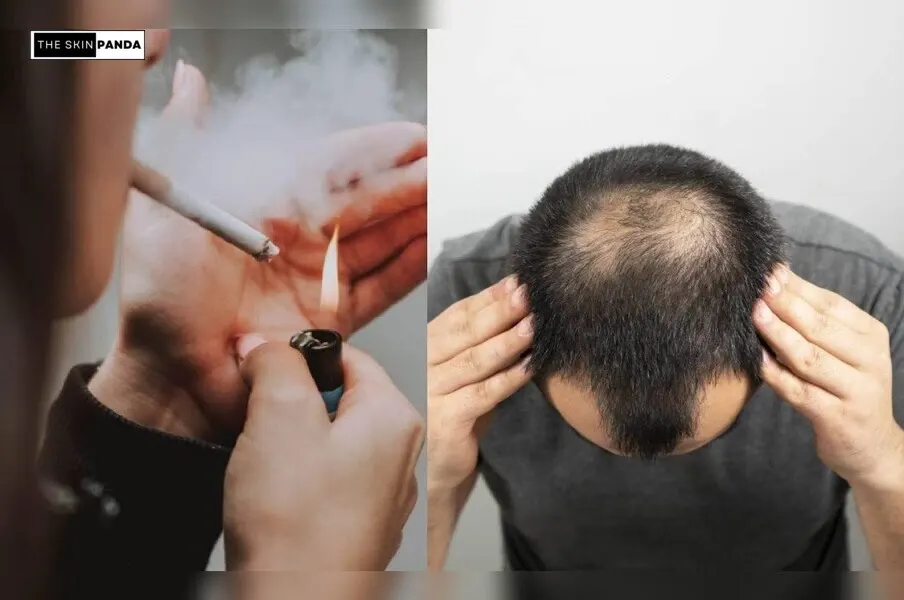Does Nicotine Cause Hair Loss? Are you curious about the connection between nicotine and hair loss? Join us as we delve into the science behind this debated topic. Discover the potential impacts of nicotine on hair health, explore studies, and gain insights into how lifestyle choices may influence your mane’s vitality.
Nicotine, a highly addictive substance found in various tobacco products and e-cigarettes, has long been a topic of concern due to its potential health impacts.
While its detrimental effects on the cardiovascular and respiratory systems are well-documented, a growing question has emerged: Could nicotine also be linked to hair loss?
As millions of people around the world continue to use nicotine through smoking and vaping, it’s crucial to address this concern and separate fact from fiction.
As you continue reading, we will take you into the scientific research to uncover whether there’s a genuine connection between nicotine consumption and hair loss.
By examining the mechanisms through which nicotine interacts with the body and considering the findings of recent studies, we aim to provide a clearer understanding of this complex issue.
Must Read: Hyperpigmentation and Tretinoin Before and After
Whether you’re a nicotine user or simply curious about its potential consequences, read on to explore the truth behind the claims of nicotine-induced hair loss.
What to Know About Nicotine
Nicotine, a potent alkaloid found in tobacco leaves, is known for its psychoactive effects and addictive properties. It’s primarily consumed through smoking cigarettes, cigars, pipes, and more recently, through vaping electronic cigarettes.
This compound is rapidly absorbed into the bloodstream, leading to an almost immediate release of adrenaline, dopamine, and other neurotransmitters that create a sense of alertness and pleasure.
Cigarette smoke delivers nicotine to the lungs, where it enters the bloodstream and travels to the brain, impacting various neural pathways.
In the case of vaping, nicotine-infused liquids are heated to create an aerosol, which is then inhaled into the lungs.
This method has gained popularity as a perceived safer alternative to traditional smoking, although ongoing research is evaluating its long-term effects.
Nicotine’s effects extend beyond the central nervous system, affecting heart rate, blood pressure, and even metabolism.
These physiological responses contribute to its addictive nature, making it challenging for individuals to quit smoking or vaping once they become accustomed to nicotine’s effects.
As nicotine interacts with the body’s systems, its potential impact on various aspects of health, including hair loss, has become a topic of interest and concern.
The Link Between Nicotine and Hair Loss

Amidst the myriad health concerns associated with nicotine use, the notion of nicotine contributing to hair loss has captured attention.
Anecdotal accounts and widespread beliefs have fueled the idea that nicotine could be a culprit in thinning hair and receding hairlines. However, separating fact from speculation requires a closer examination of scientific research.
While numerous claims exist regarding nicotine’s role in hair loss, it’s important to note that conclusive evidence has yet to be established.
Many factors contribute to hair health and loss, including genetics, hormonal changes, aging, nutritional status, and overall health. Pinpointing nicotine as the sole cause of hair loss oversimplifies a complex biological process.
Several studies have attempted to shed light on this matter, but the results are inconclusive and often conflicting. Some studies suggest a potential correlation between nicotine use and hair loss, while others fail to find a direct link.
These mixed outcomes emphasize the need for more comprehensive research that considers various factors and potential confounding variables.
In the upcoming sections, we will delve deeper into the scientific investigations conducted to determine whether nicotine truly plays a causative role in hair loss or if there are underlying mechanisms that deserve equal attention.
By examining the impact of nicotine on blood circulation, hormones, and stress levels, we can gain a more nuanced understanding of its potential relationship with hair health.
Exploring Scientific Studies of Nicotine
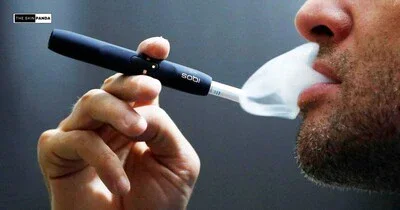
To unravel the mystery behind the potential link between nicotine and hair loss, researchers have undertaken scientific studies aimed at uncovering any correlations or causal relationships.
While the findings remain far from definitive, these studies provide valuable insights into the complex interplay between nicotine consumption and hair health.
Several recent studies have focused on investigating the potential effects of nicotine on hair follicles. These studies have examined both animal models and human subjects to determine whether nicotine exposure contributes to hair loss.
However, the results have been divergent, with some studies indicating a negative impact on hair growth while others show no significant association.
One avenue of investigation involves the impact of nicotine on blood circulation and nutrient delivery to hair follicles.
Reduced blood flow to the scalp can impair the follicles’ ability to receive essential nutrients, leading to hair thinning and loss. Some studies suggest that nicotine’s vaso-constrictive properties, which narrow blood vessels, could hinder blood flow to the scalp.
However, the degree to which this phenomenon occurs and its direct impact on hair health remain subjects of ongoing research and debate.
Moreover, researchers have explored nicotine’s potential influence on hormones that play a role in hair growth and loss. Nicotine affects hormone regulation, particularly stress-related hormones like cortisol and adrenaline.
Stress is recognized as a contributor to hair loss, and nicotine’s impact on stress hormones could indirectly influence hair health. However, the exact mechanisms through which nicotine-induced hormonal changes might lead to hair loss are still not fully understood.
Does Nicotine Cause Hair Loss? Separating Fact from Speculation
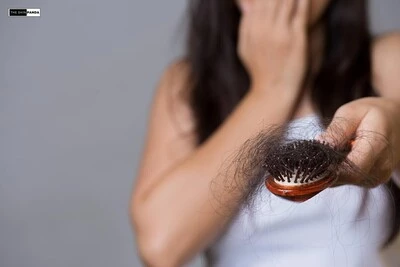
The question of whether nicotine directly causes hair loss is a topic that has garnered attention and speculation.
While numerous claims and anecdotes circulate regarding nicotine’s potential to lead to hair thinning and baldness, it’s essential to approach this topic with a balanced perspective informed by scientific evidence.
As of now, a clear and definitive causal link between nicotine consumption and hair loss has not been established. Research on this matter has yielded inconclusive and conflicting results, making it challenging to draw definitive conclusions. Hair loss is a complex biological process influenced by genetics, hormones, age, underlying health conditions, and lifestyle factors.
Also read: Is Makeup Bad For Your Skin?
Several scientific studies have aimed to explore the potential connection between nicotine and hair loss. These studies have considered various aspects, including nicotine’s impact on blood circulation, hormone regulation, and stress levels.
However, the outcomes have varied, with some studies suggesting a potential correlation while others failing to find a significant relationship.
One proposed mechanism through which nicotine might contribute to hair loss involves its effect on blood circulation. Nicotine’s vasoconstrictive properties could potentially reduce blood flow to the scalp, impairing nutrient delivery to hair follicles.
This, in turn, might impact hair growth. However, the extent to which nicotine-induced vasoconstriction affects hair health remains a subject of ongoing investigation.
Nicotine’s influence on hormones, particularly stress-related hormones like cortisol and adrenaline, adds another layer of complexity to the equation.
Stress is recognized as a potential trigger for hair loss, and nicotine’s impact on stress hormones could indirectly influence hair health. Yet, the specific pathways through which this influence occurs are not fully elucidated.
It’s crucial to approach the question of nicotine and hair loss with a critical eye and an understanding of the broader context. Factors such as genetics, hormonal imbalances, nutrition, and overall health contribute significantly to hair loss.
While nicotine’s potential role cannot be dismissed outright, it’s important to avoid oversimplification and to consider the multitude of factors at play.
In conclusion, while there is ongoing research exploring the potential links between nicotine and hair loss, current evidence does not conclusively establish nicotine as a direct cause of hair loss.
If you have concerns about hair health, it’s advisable to consult with medical professionals who can provide personalized guidance based on your unique circumstances.
Ultimately, making informed decisions about nicotine use and its potential impact on overall health should be the result of careful consideration and well-rounded information.
Does Nicotine Gum Cause Hair Loss?
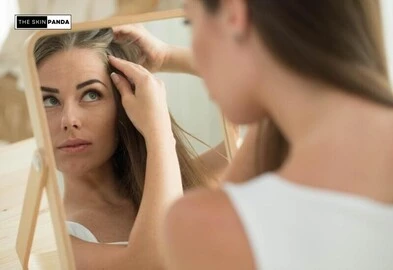
The use of nicotine gum as a smoking cessation aid has gained popularity as a method to help individuals quit smoking.
However, concerns have arisen regarding its potential impact on hair health. The question of whether nicotine gum could cause hair loss deserves a closer look, considering the broader context of nicotine’s effects on the body.
As of now, there is limited scientific research specifically addressing the potential link between nicotine gum and hair loss. Most studies have focused on the effects of nicotine from smoking or vaping, rather than from nicotine replacement therapies like gum.
Consequently, any claims regarding nicotine gum and hair loss should be approached with caution, as evidence in this area is sparse.
Nicotine gum is designed to deliver controlled amounts of nicotine to individuals attempting to quit smoking. It helps manage withdrawal symptoms by providing a safer alternative to smoking while gradually reducing nicotine dependence.
Unlike smoking, which exposes the body to numerous harmful compounds found in tobacco, nicotine gum eliminates many of these harmful components.
When considering the potential for nicotine gum to cause hair loss, it’s important to distinguish between nicotine itself and other harmful substances found in tobacco smoke.
Hair loss is a multifaceted issue influenced by genetics, hormones, stress, and overall health. Nicotine’s impact on blood circulation and hormones has led to speculation about its potential contribution to hair loss, but the scientific community has not reached a consensus on this matter.
If you’re considering using nicotine gum to quit smoking and are concerned about its potential impact on hair health, it’s advisable to consult with healthcare professionals. They can provide personalized guidance based on your medical history, existing conditions, and concerns.
Moreover, adopting a comprehensive approach to hair health by addressing factors such as genetics, diet, stress, and overall well-being is essential.
In conclusion, the existing scientific evidence does not definitively support the idea that nicotine gum directly causes hair loss. While concerns have been raised, it’s important to recognize that the effects of nicotine from different sources may vary.
If you’re using nicotine gum as part of a smoking cessation strategy, focusing on its intended benefits and consulting with medical experts is key. As with any health-related concern, a well-informed approach is the best way to make decisions that align with your overall well-being.
Do Nicotine Pouches Cause Hair Loss?
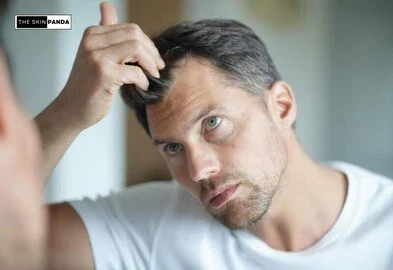
Nicotine pouches, a smokeless alternative to traditional tobacco products, have gained popularity as a discreet and potentially less harmful way to consume nicotine.
As with any nicotine-containing substance, questions arise about potential health impacts, including their role in hair loss.
Let’s delve into the available information to examine whether nicotine pouches could be linked to hair loss.
Currently, scientific research specifically investigating the potential connection between nicotine pouches and hair loss is limited.
Most studies on nicotine and hair loss have primarily focused on smoking and, to a lesser extent, vaping. As a result, the effects of nicotine pouches on hair health remain an area that requires further exploration.
Nicotine pouches are designed to deliver nicotine through the oral mucosa, providing a smoke-free method for nicotine consumption.
Unlike smoking, which involves inhaling numerous harmful compounds from burning tobacco, nicotine pouches eliminate the combustion process. This significantly reduces exposure to many of the toxins associated with smoking.
When considering the potential impact of nicotine pouches on hair health, it’s important to differentiate between nicotine itself and the various harmful components present in tobacco smoke.
Hair loss is a multi-factorial issue influenced by genetics, hormones, stress, and overall health. Nicotine’s effects on blood circulation and hormones have led to speculation about its role in hair loss, but solid evidence remains elusive.
If you’re using nicotine pouches and are concerned about their potential impact on hair health, seeking guidance from healthcare professionals is recommended.
They can offer personalized advice based on your medical history, existing conditions, and concerns. Additionally, adopting a holistic approach to hair health by addressing factors such as genetics, diet, stress, and general well-being is crucial.
In conclusion, the current scientific understanding does not firmly establish a direct link between nicotine pouches and hair loss. As research continues to evolve, it’s important to consider the broader context and weigh potential benefits and risks.
If you’re using nicotine pouches as an alternative to smoking, focusing on harm reduction and overall health is a prudent approach. As always, informed decision-making guided by expert advice is key to maintaining your well-being.
Does Vaping Nicotine Cause Hair Loss?

Vaping, the act of inhaling vapor from an electronic cigarette or similar device, has gained popularity as an alternative to traditional tobacco smoking.
However, concerns have arisen about the potential health effects of vaping, including its impact on hair health. In this section, we explore whether there is a connection between vaping nicotine and hair loss.
The relationship between vaping nicotine and hair loss is a topic that lacks comprehensive scientific consensus.
While vaping eliminates many harmful compounds associated with traditional smoking, the effects of nicotine on various aspects of health including its potential role in hair loss are still being studied.
Nicotine, a primary component of both traditional cigarettes and many vaping liquids, affects the body in various ways. It can constrict blood vessels and impact circulation, potentially affecting nutrient delivery to hair follicles.
Additionally, nicotine influences hormonal balance, including stress-related hormones like cortisol, which are linked to hair health.
Research specifically examining the effects of vaping nicotine on hair loss is limited. Most studies on nicotine’s impact on hair health have focused on traditional smoking.
Therefore, it’s important to approach claims about vaping and hair loss with caution, recognizing the need for more research to establish a clear connection.
Factors contributing to hair loss are multi-factorial, including genetics, hormones, age, stress, nutrition, and overall health. While nicotine’s potential influence on these factors is being investigated, attributing hair loss solely to vaping nicotine oversimplifies the complexity of the issue.
If you’re concerned about the potential impact of vaping nicotine on hair health, consulting healthcare professionals is recommended. They can provide personalized guidance based on your medical history, concerns, and individual circumstances.
Maintaining a balanced approach to overall health, including managing stress, maintaining proper nutrition, and seeking expert advice, is essential for well-being.
In conclusion, the relationship between vaping nicotine and hair loss is an area of ongoing research. While some potential mechanisms exist, conclusive evidence is currently lacking.
If you’re considering vaping as an alternative to smoking or have concerns about its effects on hair health, seeking informed medical advice is a prudent step.
Understanding the potential risks and benefits of vaping and making choices aligned with your overall health goals is crucial.
Hormonal Impact of Nicotine
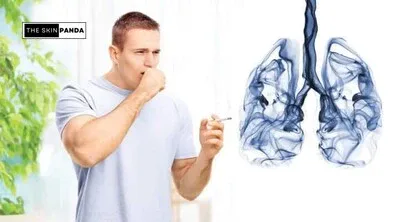
Nicotine, a powerful alkaloid found in tobacco products and nicotine replacement therapies, exerts a range of effects on the human body, including its influence on hormones.
Understanding the intricate hormonal impact of nicotine is essential for comprehending its potential relationship with various health outcomes, including hair health.
Nicotine and Stress Hormones
Nicotine has been shown to affect the release of several hormones, most notably stress-related hormones such as cortisol and adrenaline.
These hormones play a pivotal role in the body’s fight-or-flight response, influencing heart rate, blood pressure, and overall stress levels.
While short-term increases in stress hormones can be adaptive, chronic elevation may lead to various health issues, including hair loss.
Stress is recognized as a potential trigger for hair loss, with conditions like telogen effluvium resulting from heightened stress levels.
Nicotine’s impact on stress hormones might indirectly contribute to hair loss by amplifying the effects of chronic stress.
However, it’s important to note that the relationship between stress, hormones, and hair loss is complex and influenced by numerous factors beyond nicotine alone.
Endocrine Disruption
Nicotine’s influence extends to the endocrine system, which regulates hormone production and distribution throughout the body.
Disruptions in this delicate balance can potentially impact various bodily functions, including hair growth and maintenance.
Hormones such as testosterone, estrogen, and thyroid hormones are vital contributors to hair health, and alterations in their levels could potentially affect hair growth.
Hormones and Hair Follicles
Hair follicles are exquisitely sensitive to hormonal changes, which is why shifts in hormone levels during life stages such as pregnancy, menopause, and puberty often lead to changes in hair growth patterns.
Hormones interact with hair follicles in intricate ways, affecting the duration of hair growth phases and the overall thickness and texture of hair.
The hormonal impact of nicotine could theoretically influence these intricate processes. However, the precise mechanisms by which nicotine-induced hormonal changes might lead to hair loss remain areas of ongoing investigation.
How to Reverse Nicotine-Related Hair Loss

Nicotine-related hair loss, if indeed linked to nicotine use, can be a complex issue to address. While the precise relationship between nicotine and hair loss is not fully understood, there are several steps you can consider taking to promote hair health and potentially mitigate any negative effects.
1. Consult a Healthcare Professional: If you suspect nicotine use is contributing to your hair loss, consulting a healthcare professional is the first step. They can assess your individual situation, provide medical guidance, and rule out other potential causes of hair loss.
2. Consider Nicotine Alternatives: If you’re using nicotine products and concerned about hair loss, you might explore nicotine replacement therapies, such as nicotine gum or patches, which eliminate harmful compounds associated with smoking or vaping.
3. Manage Stress: Stress is a known contributor to hair loss, and nicotine’s impact on stress hormones could exacerbate this effect. Incorporate stress-reduction techniques such as mindfulness, meditation, exercise, and hobbies to help manage stress levels.
4. Maintain a Balanced Diet: Proper nutrition is essential for hair health. Ensure your diet includes a variety of nutrients like vitamins, minerals, and proteins that support hair growth and follicle health.
5. Stay Hydrated: Drinking an adequate amount of water supports overall health, including hair health. Proper hydration contributes to the health of hair follicles and the scalp.
6. Consider Hair Supplements: Some supplements, like biotin and omega-3 fatty acids, are often associated with improved hair health. However, consult with a healthcare provider before introducing supplements into your routine.
7. Use Gentle Hair Care Products: Harsh shampoos and excessive heat styling can contribute to hair damage. Opt for mild, sulfate-free shampoos and limit heat styling to minimize stress on your hair.
8. Be Patient: Hair growth is a gradual process, and it takes time for changes to become noticeable. Consistency in healthy habits is key to seeing improvements in hair health.
9. Avoid Smoking and Vaping: If you’re concerned about nicotine-related hair loss, avoiding or reducing nicotine consumption is a logical step. Quitting smoking or vaping altogether can have numerous health benefits beyond hair health.
10. Monitor Progress: Keep track of any changes in your hair’s texture, thickness, and shedding. If you notice improvements or worsening, discuss them with a healthcare professional.
It’s important to note that reversing hair loss, especially if it’s related to nicotine consumption, may require a combination of strategies and time.
Individual responses vary, and results may not be immediate. Consulting a medical expert and adopting a holistic approach to health is fundamental in your journey toward healthier hair.
People Also Ask (FAQs)
Question 1. Will Hair Loss from Nicotine Grow Back?
Answer: While individual responses can vary, reducing or quitting nicotine consumption may allow hair follicles to recover over time. Consulting a healthcare professional can provide personalized guidance on addressing hair loss concerns.
Question 2. Does Nicotine Affect Your Hair?
Answer: Research suggests that nicotine’s impact on blood circulation and hormones could potentially play a role in hair health. However, the exact relationship between nicotine and hair loss is complex and requires further investigation.
Question 3. Will quitting Nicotine Help Hair Loss?
Answer: Ceasing nicotine consumption might positively impact hair health by reducing potential stress on hair follicles and improving blood circulation. Consulting a healthcare professional can offer tailored advice on managing hair loss concerns.
Question 4. Will Quitting Nicotine Make My Hair Thicker?
Answer: While the connection isn’t guaranteed, quitting nicotine could potentially contribute to improved hair health by reducing potential factors like stress and impaired blood circulation. Individual results may vary, and seeking medical guidance is recommended for addressing hair thickness concerns.
Question 5. How Long Does it Take for Nicotine to Leave Your System?
Answer: How long does it take for nicotine to leave your system? Nicotine is typically eliminated from the body within 2 to 3 days, but metabolites might remain detectable for several weeks in some cases.
Question 6. What are the Benefits of Quitting Nicotine?
Answer: What are the benefits of quitting nicotine? Quitting nicotine can lead to improved lung health, reduced cardiovascular risks, and better overall well-being, potentially benefiting both physical health and quality of life.
Question 7. Does Vaping Change Your Hair?
Answer: While direct effects are uncertain, vaping’s impact on blood circulation and stress hormones could indirectly influence hair health, though more research is needed for a conclusive answer.
Question 8. Does Caffeine Increase Hair Loss?
Answer: Limited evidence suggests that moderate caffeine consumption is unlikely to significantly contribute to hair loss, but individual responses may vary.
Question 9. How can I Reverse my Hair Loss?
Answer: How can I reverse my hair loss? Depending on the cause, options include lifestyle changes, medical treatments, and consult a healthcare professional for personalized guidance on regaining hair health.
Conclusion
The question of whether nicotine consumption, whether through smoking, vaping, or nicotine replacement therapies, directly leads to hair loss remains a topic of interest and ongoing scientific inquiry.
Throughout this exploration, we’ve delved into the available evidence, considered potential mechanisms, and emphasized the complexity of this issue.
While anecdotal accounts and popular beliefs may suggest a connection between nicotine and hair loss, the scientific research is far from providing a definitive answer.
Numerous factors contribute to hair health and hair loss, including genetics, hormones, stress, age, nutrition, and overall well-being. Pinpointing nicotine as the sole culprit oversimplifies a process influenced by a multitude of variables.
Studies investigating the link between nicotine and hair loss have yielded conflicting results, highlighting the need for more comprehensive and focused research.
While nicotine’s impact on blood circulation, hormones, and stress response has been explored, clear causality has not been established. The effects of nicotine can differ based on the method of consumption, dosage, and individual variations.
Navigating the complexities of nicotine and its potential influence on hair health requires a balanced approach. If you’re using nicotine products or considering them, being aware of their potential effects on various aspects of health, including hair health, is important.
However, making informed decisions should involve consulting healthcare professionals who can provide personalized guidance tailored to your unique circumstances.
Disclaimer
The information provided in this article is for educational and informational purposes only. It is not intended as a substitute for professional medical advice, diagnosis, or treatment. Always seek the advice of your physician or other qualified healthcare providers with any questions you may have regarding a medical condition. Never disregard professional medical advice or delay in seeking it based on the content of this article.
